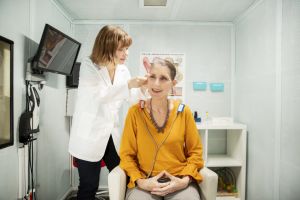|
www.HealthyHearing.com |
Cancer treatments and hearing loss: What's the connection?Chemotherapy, surgery, and radiation can all affect hearing and balance
Contributed by Madeleine Burry Key points:
Cancer treatment typically relies on a trio of treatment options: radiation, surgery, and chemotherapy, often performed in conjunction—for instance, a person may have surgery followed by a course of radiation and chemotherapy. While life-saving, many cancer chemotherapy drugs come with serious side effects. These include hearing-related side effects such as hearing loss, tinnitus (ringing in your ears) and balance problems. While sometimes these side effects are temporary and get better after treatment ends, often they’re permanent. All three cancer treatment options have the potential to damage hearing, depending on the location of the cancer.
Chemotherapy and hearing loss (especially cisplatin)Chemotherapy refers to the use of powerful chemicals that are capable of killing cancer cells. In some cases, chemotherapy drugs can be "ototoxic," which means they are harmful to hearing. This is especially the case for chemotherapy known as platinum-based therapy (that is, chemo meds containing the element platinum). The most ototoxic platinum-based chemotherapy is cisplatin, according to a review article in Cancer Chemotherapy and Pharmacology. Cisplatin is commonly used to treat bladder, testicular, and ovarian cancer among adults, according to the National Cancer Center. Among kids, it is sometimes used to treat brain, liver and bone tumors, according to St. Jude's Children Research Hospital. Hearing-related side effects are fairly common: Permanent hearing loss occurs in about half of all patients who take cisplatin, ASHA notes. It usually causes high-frequency hearing loss. A 2024 study of 100 testicular cancer patients published in JAMA Oncology found that nearly 80% had developed hearing loss, especially those who were older, received higher doses of cisplatin, or had high cholesterol. Hearing loss from cisplatin is common among kidsSeventy-five per cent of patients five years old and younger had cisplatin-related hearing loss three years after starting therapy, a 2021 University of British Columbia study shows. “Young children [are] particularly vulnerable to the ototoxic effects of cancer therapies,” affirms a 2016 review article in the journal Cancer. This is because the brain and ears are still forming in young childhood, the article notes. Not only is hearing loss more common in children who take cisplatin, but it’s also more severe, per ASHA. Plus, even small amounts of hearing loss in high frequencies are a big deal to younger children acquiring language. Why does it cause hearing loss?Scientists are still working to understand why cisplatin damages hearing—it may be because it easily enters the inner ear (while other drugs are blocked) but doesn’t seem to exit it, according to ASHA. Once in the inner ear, the medications may cause damage to hair cells, which are vital to the hearing process. Other platinum-based chemotherapies that treat solid tumors, such as carboplatin and oxaliplatin, are less likely to damage hearing, although they can still cause issues. For instance, carboplatin can cause ringing in the ears (tinnitus), notes the Mayo Clinic. Other chemo drugsThere are other chemotherapies that don’t fall into the platinum-based category that can still cause hearing problems or tinnitus. They include vincristine, doxorubicin, gemcitabine, cyclophosphamide, oxaliplatin, and farmorubicin, notes a 2016 study published in the Brazilian Journal of Otorhinolaryngology. Radiation treatment combined with these ototoxic chemotherapy medications increases the risk for hearing-related issues. Non-cancer drugs can also cause problemsKeep in mind, other medications besides chemotherapy taken during cancer treatment—such as pain medications, anti-nausea meds, or antibiotics—can also lead to hearing problems. There are at least 200 medications linked to hearing loss, including over-the-counter medications like aspirin. SurgeryIf you have a form of cancer that requires surgery in the brain, ear, or auditory nerve, hearing problems could occur, according to the Canadian Cancer Society (CCS). Removing a cancerous tumor, for instance, might cause damage to the ear. Related: Hospital safety when you have hearing loss RadiationDuring radiation treatment, high-energy waves or particles are used to destroy or damage cancer cells. If radiation is needed anywhere in the head and neck, it can potentially lead to two types of hearing loss:
How to weigh the risks
for current and former cancer patients who received treatment linked to hearing loss. Cancer is a life-threatening disease, which is why doctors use powerful treatment methods, despite the host of known side effects. Knowing the potential risks is helpful, since it can help you assess if the risk is worth it to you personally. Talk to your doctor about the drug's side effects and if there are any alternatives. ASHA recommends following these steps if you are taking known ototoxic medications:
Can anything prevent treatment-related hearing loss?Sometimes, an alternative therapy can be given if you're particularly concerned about hearing loss or tinnitus. It's very important to talk to your oncologist about the benefits and risks of the treatments you're receiving. Researchers are also looking at "otoprotective agents"—drugs that can protect hearing when given as the same time as harmful drugs, according to Research Outreach. For instance, ASHA points out that administering sodium thiosulfate (which is typically used to treat cyanide poisoning) may limit hearing loss from cisplatin in children. The trick is figuring out how to give patients otoprotective medications while still allowing chemotherapy medications to be effective. Treating the hearing lossIf you've received cancer treatment and have permanent hearing loss, it's important to see a hearing care provider for expert help. You may be a good candidate for hearing aids, cochlear implants, or assistive listening devices. Madeleine Burry
|
Featured clinics near me
Earzlink Hearing Care - Reynoldsburg
7668 Slate Ridge Blvd
Reynoldsburg, OH 43068

Find a clinic
We have more hearing clinic reviews than any other site!



 Madeleine Burry is a Brooklyn-based freelance writer and editor. She's written about health for several online publications, including Women's Health, Prevention, Health, Livestrong and Good Housekeeping. You can follow her on Twitter @lovelanewest.
Madeleine Burry is a Brooklyn-based freelance writer and editor. She's written about health for several online publications, including Women's Health, Prevention, Health, Livestrong and Good Housekeeping. You can follow her on Twitter @lovelanewest.